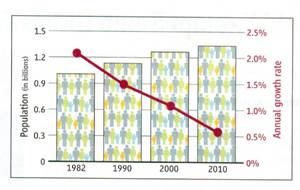
It appears that they are headed toward no growth.
A sad number from China:
China is big. (China’s Population Growing Slowly, Changing Fast ECONOMIST vol. 332 no. 6303 May 6, 2011 page 650) My father once offered me a mind bender, “If the Chinese were walking past a pole six abreast at a rapid clip, how long would it take for them to walk past?” The answer was that they would never get past. Their numbers were growing faster than that. This is no longer the case. They are now growing at about half that rate.
Well and good. Their resources are sorely taxed and their environment stressed by the combination of continued growth and rapidly improving standard of living. Less gross, less stress.
However the birth rate has been below replacement for some time and more and more often one hears that the one child policy, by which a couple is expected to have only one child, will have to be revised some day. Things are made worse because the birth rate of girls is below that of boys. The birth rate will continue to fall.
The prediction on offer is that the birth rate will go from a present 1.5 babies per woman to 1.3. At that point, if it follows the trend of other countries it will for a time tend to level off.
At the same time, China’s population is aging fast. Well we knew that had to happen. Slow the babies and you reduce the number of young people relative to the old. There is lots of company in that club. And of course older people are generally less productive than they were when they were young. Experience is great, but it does not quite match physiology.
Here is their graph of the growth rate:

It appears that they are headed toward no growth.
Rapid growth is destabilizing. So is rapid decline. Even rapid change in the age distribution of a population is destabilizing. You have to wonder how we have made it this far through history. Well it hasn’t been a very smooth ride; I suppose we can all agree on that.
The surprise, however, is at the other end of the age spectrum. Ten years ago women were living about three years longer than men on average. It is now, hold your breath, about 8 years longer.
That they describe as, “Almost impossible.”
Of course highly trained experts are working to make sure the numbers are valid. But let us assume it is the truth. In that case I shall make a couple of predictions.
The first prediction is that if and when China gets around to saying anybody can have as many children as the want to have it will make no perceptible change in the overall numbers. Governments wield great power. They can exterminate people in appalling numbers as the 20th century demonstrated so often. But nothing I have seen suggests that they actually control the stork.
It is like a sign I once saw in a little pub in Wales. I had stopped at a hotel and wandered down to the pub, which sat on a cliff above the sea. Alas for mood it was a fair night. It should have been stormy. High on one wall was a circular sign. In the center was the picture of a fishing boat in heavy weather. Around it was a motto in Latin. I amused myself by translating it. The words went in a circle so that it was ambiguous where to begin. Begin at one place and it said, “It is necessary to sail; it is not necessary to survive.” Starting at another place it said, “It is necessary to survive; it is not necessary to sail.”
Nature is unequivocal: “It is necessary to reproduce; it is not necessary to survive.” Or rather it is necessary to reproduce if nature so commands. Otherwise it is forbidden.
A law really cannot control the birth rate. I have heard that even in the hell of Nazi concentration camps the birth rate never budged from what it had been in happier times.
So the birth rate will not change when the law does. It will linger at about the 1.3 level and then, if the future reflects that past, it will plunge.
The other prediction is this. When they get a good look at just why men are living 8 years less than women, it will be very sad indeed. It may be biologically impossible for women to outlive men by such a margin, but it is socially possible. I fear that those men are failing to take care of themselves, indeed that they are committing suicide. And since people are pretty much the same everywhere and respond similarly to similar situations, I fear that we are going to have to get used an epidemic of elderly suicides in years to come to.
Do not say, “I don’t care about infertility; it doesn’t affect me.” It has you in its sights.
There have been 14,869 visitors so far.